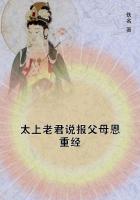Abercromby's theory he should have resorted for help to the Sky-god, not to the sprite. But he did the reverse: he said, "I cannot approach Num, he is too far away; if I could reach him I should not beseech thee (the familiar spirit), but should go myself; but Icannot". For this precise reason, people who have developed the belief in accessible affable spirits go to them, with a spell to constrain, or a gift to bribe, and neglect, in some cases almost forget, their Maker. But He is worshipped by low savages, who do not propitiate ghosts and who have no gods in wells and trees, close at hand. It seems an obvious inference that the greater God is the earlier evolved.
These are among the difficulties of the current anthropological theory. There is, however, a solution by which the weakness of the divine conception, its neglected, disused aspect among barbaric races, might be explained by anthropologists, without regarding it as an obsolescent form of a very early idea. This solution is therefore in common use. It is applied to the deity revealed in the ancient mysteries of the Australians, and it is employed in American and African instances.
The custom is to say that the highest divine being of American or African native peoples has been borrowed from Europeans, and is, especially, a savage refraction from the God of missionaries. If this can be proved, the shadowy, practically powerless "Master of Life" of certain barbaric peoples, will have degenerated from the Christian conception, because of that conception he will be only a faint unsuccessful refraction. He has been introduced by Europeans, it is argued, but is not in harmony with his new environment, and so is "half-remembered and half forgot".
The hypothesis of borrowing admits of only one answer, but that answer should be conclusive. If we can discover, say in North America, a single instance in which the supreme being occurs, while yet he cannot possibly be accounted for by any traceable or verifiable foreign influence, then the burden of proof, in other cases, falls on the opponent. When he urges that other North American supreme beings were borrowed, we can reply that our crucial example shows that this need not be the fact. To prove that it is the fact, in his instances, is then his business. It is obvious that for information on this subject we must go to the reports of the earliest travellers who knew the Red Indians well.
We must try to get at gods behind any known missionary efforts.
Mr. Tylor offers us the testimony of Heriot, about 1586, that the natives of Virginia believed in many gods, also in one chief god, "who first made other principal gods, and then the sun, moon and stars as petty gods". Whence could the natives of Virginia have borrowed this notion of a Creator before 1586? If it is replied, in the usual way, that they developed him upwards out of sun, moon and star gods, other principal gods, and finally reached the idea of the Creator, we answer that the idea of the Maker is found where these alleged intermediate stages are NOT found, as in Australia.
In Virginia then, as in Victoria, a Creator may have been evolved in some other way than that of gradual ascent from ghosts, and may have been, as in Australia and elsewhere, prior to verifiable ghost-worship. Again, in Virginia at our first settlement, the native priests strenuously resisted the introduction of Christianity.
They were content with their deity, Ahone, "the great God who governs all the world, and makes the sun to shine, creating the moon and stars his companions. . . . The good and peaceable God . . .
needs not to be sacrificed unto, for he intendeth all good unto them." This good Creator, without sacrifice, among a settled agricultural barbaric race sacrificing to other gods and ghosts, manifestly cannot be borrowed from the newly arrived religion of Christianity, which his priests, according to the observer, vigorously resisted. Ahone had a subordinate deity, magisterial in functions, "looking into all men's actions" and punishing the same, when evil. To THIS god sacrifices WERE made, and if his name, Okeus, is derived from Oki = "spirit," he was, of course, an animistic ghost-evolved deity. Anthropological writers, by an oversight, have dwelt on Oki, but have not mentioned Ahone.
Manifestly it is not possible to insist that these Virginian high deities were borrowed, without saying whence and when they were borrowed by a barbaric race which was, at the same time, rejecting Christian teaching.
Mr. Tylor writes, with his habitual perspicacity: "It is the widespread belief in the Great Spirit, whatever his precise nature and origin, that has long and deservedly drawn the attention of European thinkers to the native religions of the North American tribes". Now while, in recent times, Christian ideas may undeniably have crystallised round "the Great Spirit," it has come to be thought "that THE WHOLE DOCTRINE of the Great Spirit was borrowed by the savages from missionaries and colonists. But this view will not bear examination," says Mr. Tylor.
Mr. Tylor proceeds to prove this by examples from Greenland, and the Algonkins. He instances the Massachusett God, Kiehtan, who created the other gods, and receives the just into heaven. This was recorded in 1622, but the belief, says Winslow, our authority, goes back into the unknown past. "They never saw Kiehtan, but THEYHOLD IT A GREAT CHARGE AND DUTY THAT ONE AGE TEACH ANOTHER." How could a deity thus rooted in a traditional past be borrowed from recent English settlers?
In these cases the hypothesis of borrowing breaks down, and still more does it break down over the Algonkin deity Atahocan.















